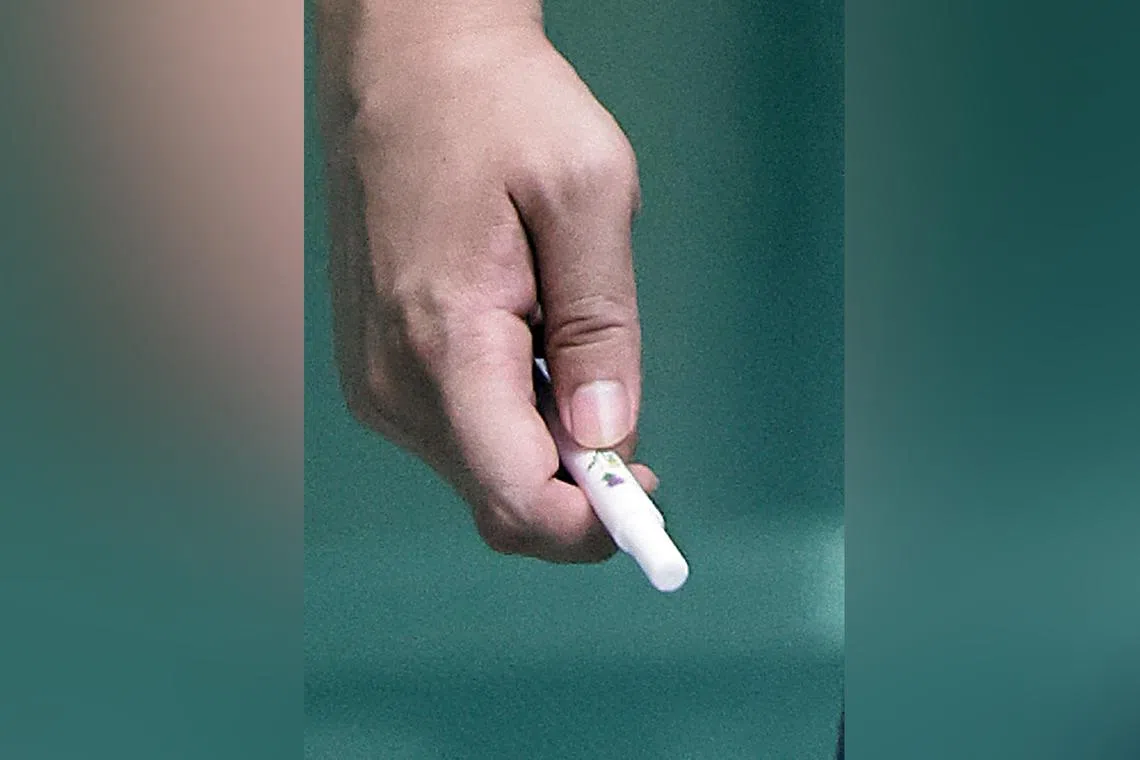Experts warn against claims that ‘vitamin diffusers’ sold online are healthy alternative to vapes
Sign up now: Get ST's newsletters delivered to your inbox

Singapore’s ban on e-vaporisers covers e-cigarettes and any electronic device that vaporises a liquid solution to be inhaled.
ST PHOTO: KELVIN CHNG
- "Vitamin diffusers" sold as healthy e-vaporiser alternatives may contain dangerous chemicals.
- Expert says there is no evidence that vitamins delivered through inhalation confer any health benefits.
- From Sept 1, stricter penalties will be implemented for vaping, including those caught with etomidate-laced vapes.
AI generated
SINGAPORE – Online peddlers of e-vaporisers are now pushing “vitamin diffusers” as a healthy alternative to e-vaporisers, but experts warn that the actual chemical content is unknown and potentially dangerous.
Promoted by social media influencers, the new trend has emerged in Britain, Australia and the United States, where researchers have warned that the marketing behind so-called “wellness vapes” is part of a new phase in misleading e-cigarette advertising.
Singapore’s ban on e-vaporisers covers e-cigarettes and any electronic device that vaporises a liquid solution to be inhaled.
Checks by The Straits Times showed that several websites are now peddling “vitamin diffusers and sticks”, and at least one person has been caught in Singapore with a vitamin diffuser.
Sellers claim their devices help boost energy levels with an infusion of caffeine, vitamin B12 and essential oils. The devices can also be loaded with melatonin for insomniacs.
Dr Philip Eng, a senior consultant respiratory physician with his own practice, said that while vitamin diffusers may be a novel trend, history suggests that inhaling unknown substances can lead to illness.
Aside from tobacco smoking, which has been linked to lung cancer, he noted that vaping had contributed to a lung injury (or Evali) epidemic in the US in 2019.
Dr Eng said that there is no medical evidence to support the claims made by the sellers of “vitamin diffusers”.
“Always think twice, think many times, before putting anything inside your body – whether you are eating or inhaling it,” he added.
Professor Eric Chan, who is deputy head of research at the NUS Department of Pharmacy and Pharmaceutical Sciences, said that while something like vitamin B12 is generally considered safe even at high doses, the potential presence of other chemicals within the vaping device could pose safety risks.
He said a 2024 toxicology study in the US of melatonin-laced vape products had revealed the presence of contaminants, including pharmaceuticals and industrial chemicals.
Said Prof Chan: “First, there may be other undeclared chemicals in the vapes beyond the vitamins and melatonin.
“Without regulation by the health authorities and full reporting of the ingredients by the vendors, these unknown chemicals will pose safety concerns.
“Second, the heat may degrade the vitamins, melatonin and contaminants into new degradants where their safety profiles are unknown as well.”
He added that vitamins and supplements should be taken only as prescribed by the doctor for those who are deficient in a particular vitamin.
Dr Puah Ser Hon, who heads the Department of Respiratory and Critical Care Medicine at Tan Tock Seng Hospital, said that there is no evidence that vitamins delivered through inhalation confer any health benefits.
“Marketing vapour-vitamin inhalation products as healthy is misleading and can pose significant risks to respiratory health and overall well-being,” he said.
Dr Puah said there are potential dangers due to the chemicals which may be present in the devices, and that the effects of inhaling are still not fully understood at this point.
Officers from the Health Sciences Authority (HSA) had on Aug 19 stopped a man outside the State Courts after he was seen using a vitamin diffuser near the building.
ST understands that the man, who was not identified, was handed a fine after he admitted to possessing an imitation tobacco product.
An HSA spokesperson said: “Although the item was not an e-vaporiser, it is an offence to purchase, use and possess imitation tobacco products under the Tobacco (Control of Advertisements and Sale) Act.”
Under the law, those caught purchasing, using or being in possession of an imitation tobacco product can be fined up to $2,000.
“These imitation products are banned because they mimic the act of smoking through delivery devices that may appear harmless, particularly to young persons who are vulnerable.
“Beyond the known and long-term health risks associated with inhaling substances not intended for consumption, these products can serve as a gateway to experiment with cigarettes or even possibly hard drugs,” said HSA.
The authorities are cracking down on vaping
On Aug 28, Home Affairs Minister K. Shanmugam, Health Minister Ong Ye Kung and Education Minister Desmond Lee announced a slew of measures to tackle vaping, including higher fines and mandatory rehabilitation for repeat vape offenders
Starting from Sept 1, first-time etomidate abusers face higher fines and a mandatory six-month rehabilitation programme when caught.
Repeat etomidate abusers face mandatory supervision, which includes drug testing and rehabilitation.
Those caught importing Kpods, which are etomidate-laced vapes, face between three and 20 years’ jail, and between five and 15 strokes of the cane.
Those caught selling or distributing the laced products face between two and 10 years’ jail and between two and five strokes of the cane.

The public can report vaping offences to the Tobacco Regulation Branch on 6684-2036 or 6684-2037 from 9am to 9pm daily, or online at www.go.gov.sg/reportvape
Those who need help to quit vaping can join the Health Promotion Board’s I Quit programme by calling the QuitLine on 1800-438-2000.
The authorities have said those who voluntarily seek support to quit vaping will not face any penalties for doing so.
Correction note: The name of the NUS Department of Pharmacy and Pharmaceutical Sciences has been updated in this version of the story.


